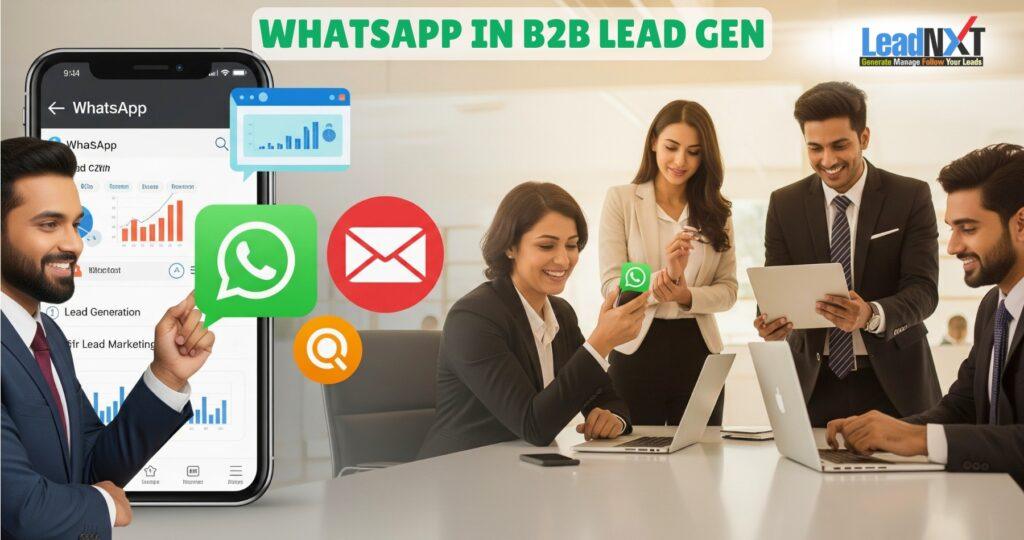
In the fast-evolving B2B landscape, where decision-making cycles are long and engagement windows are narrow, traditional methods like email and cold calls often fall short. Enter WhatsApp—a messaging platform once seen as a personal communication tool but now revolutionizing B2B lead generation through its direct, instant, and conversational power.
With over 2.7 billion users globally, WhatsApp has quietly become one of the most influential B2B channels. From nurturing leads to sending product catalogs and automating follow-ups, it now plays a central role in sales pipelines and CRM strategies.
This blog explores:
The latest trends driving WhatsApp in B2B lead generation,
The top tools and integrations to scale efforts,
Proven tips and strategies for marketers and sales professionals.
Why WhatsApp Works for B2B Lead Generation
B2B buyers today expect fast, personalized, and human-like interactions. WhatsApp fits this demand because it enables:
Real-time conversations
Higher open rates (98% vs 20% for email)
Two-way engagement (unlike one-sided email blasts)
Trust and familiarity (especially in markets like India, the Middle East, and Latin America)
More than just messaging, WhatsApp allows businesses to:
Share brochures, catalogs, videos, voice notes
Use Quick Replies for FAQs
Automate lead qualification
Send payment links or meeting invites
Enable end-to-end encryption, boosting trust
WhatsApp B2B Lead Gen Trends (2024–2025)
1. WhatsApp Business API Going Mainstream
While the regular WhatsApp Business App suits small businesses, the Business API is ideal for mid-to-enterprise B2B companies looking to:
Send bulk notifications
Automate workflows
Integrate with CRM, ERP, and marketing tools
The trend is clear: API-based communication is powering conversational commerce, support, and lead nurturing across B2B sectors.
2. AI Chatbots + WhatsApp = Smart Conversations
AI-powered WhatsApp chatbots are now handling:
Qualification of leads through questions
Routing conversations to the right sales rep
Sharing product documentation based on industry
This automation ensures 24/7 lead capture without manual intervention.
3. WhatsApp + CRM Integration
CRMs like LeadNXT, Zoho CRM, and HubSpot now offer native or third-party integrations with WhatsApp. This allows teams to:
Track every interaction within the CRM
Create WhatsApp templates for outreach
Trigger messages based on lead stage
The result? A more unified buyer journey and higher conversion rates.
4. Rich Media Messaging
B2B marketing is no longer just about whitepapers and PDFs. WhatsApp now allows:
Clickable carousels for product demos
Video explainers for solutions
Embedded CTAs in catalogs or pricing sheets
This trend is enhancing buyer education while boosting engagement.
Best Tools for WhatsApp-Based B2B Lead Generation
To scale WhatsApp for lead generation, you need more than just a phone. Here are essential tools:
1. WhatsApp Business API Providers
These platforms help you get verified and use the full power of the API:
Gupshup
WATI
Zoko
These providers also offer dashboards for managing campaigns, segmenting users, and setting up chatbots.
2. CRM Platforms with WhatsApp Integration
Look for CRMs that sync WhatsApp conversations with lead records:
LeadNXT: Great for sales automation + WhatsApp outreach
Zoho CRM: Offers multi-channel workflows including WhatsApp
HubSpot (via third-party plugins): For marketing and sales alignment
Proven Tips to Maximize WhatsApp in B2B Lead Gen
✅ 1. Use Click-to-WhatsApp Ads
Run Facebook or Instagram ads that open directly in WhatsApp. When the user clicks the ad, they’re taken to a pre-filled message like:
“Hi, I’d like to know more about your B2B software pricing.”
It’s a zero-friction lead capture technique that’s outperforming traditional lead forms.
✅ 2. Create Lead Magnets with a WhatsApp CTA
Instead of email gates, use WhatsApp to deliver:
eBooks
Case studies
Webinars
Tools or calculators
Example:
“Get the PDF directly on WhatsApp—no form needed.”
This improves both conversion and engagement, especially on mobile.
✅ 3. Build Automated Drip Campaigns
With the Business API + CRM, you can:
Send onboarding flows
Share product benefits
Follow up after a demo
Remind about pricing or deadline offers
Each message can be tailored based on lead stage.
✅ 4. Use Rich Media Templates
Product images with “Click to Book Demo” buttons
Videos introducing your B2B product
Pricing charts with one-click reply options
Use interactive message templates that guide leads toward action without overwhelming them.
✅ 5. Segment Your Contacts for Personalization
Tag users by:
Industry
Location
Product interest
Lead source
Then tailor campaigns accordingly. Example:
Send construction-related offers only to infrastructure companies, not IT firms.
✅ 6. Combine WhatsApp + Email + Call
Don’t rely on a single channel. A sample sequence:
Day 0: Ad → WhatsApp chatbot
Day 1: WhatsApp follow-up + email resource
Day 3: Phone call by SDR
Day 5: WhatsApp check-in or testimonial
This omnichannel approach improves reach and shortens sales cycles.
Industries Seeing High WhatsApp B2B Engagement
WhatsApp for B2B isn’t limited to one niche. Leading use cases include:
🔧 Industrial & Manufacturing
Sharing catalogs
Sending technical specs
Follow-up after trade shows
🏢 Real Estate & Infra B2B
Brochure sharing
Site visit bookings
Commercial lease queries
📦 SaaS & Tech
Onboarding flows
Demo scheduling
Customer support
📚 EdTech & Training
Course updates
Lead nurturing for corporates
Payment reminders
💼 Recruitment & HR Tech
Interview scheduling
Resume collection
Onboarding checklists
Compliance & Etiquette Tips
To avoid account bans or poor UX:
Always get opt-in before messaging
Use approved templates for outbound messages
Don’t spam or over-message
Be clear and professional in tone
Use official business profiles with branding, website, and contact info
Final Thoughts: The WhatsApp Opportunity in B2B
As traditional inboxes get crowded and response times stretch, WhatsApp is offering B2B companies a direct line to prospects—fast, engaging, and measurable. But to truly benefit, businesses must:
Integrate WhatsApp into their CRM and marketing stack
Automate intelligently, without sounding robotic
Create value-first interactions at every touchpoint
In 2025 and beyond, WhatsApp is not just a support tool, but a core B2B lead gen engine—if used right.
